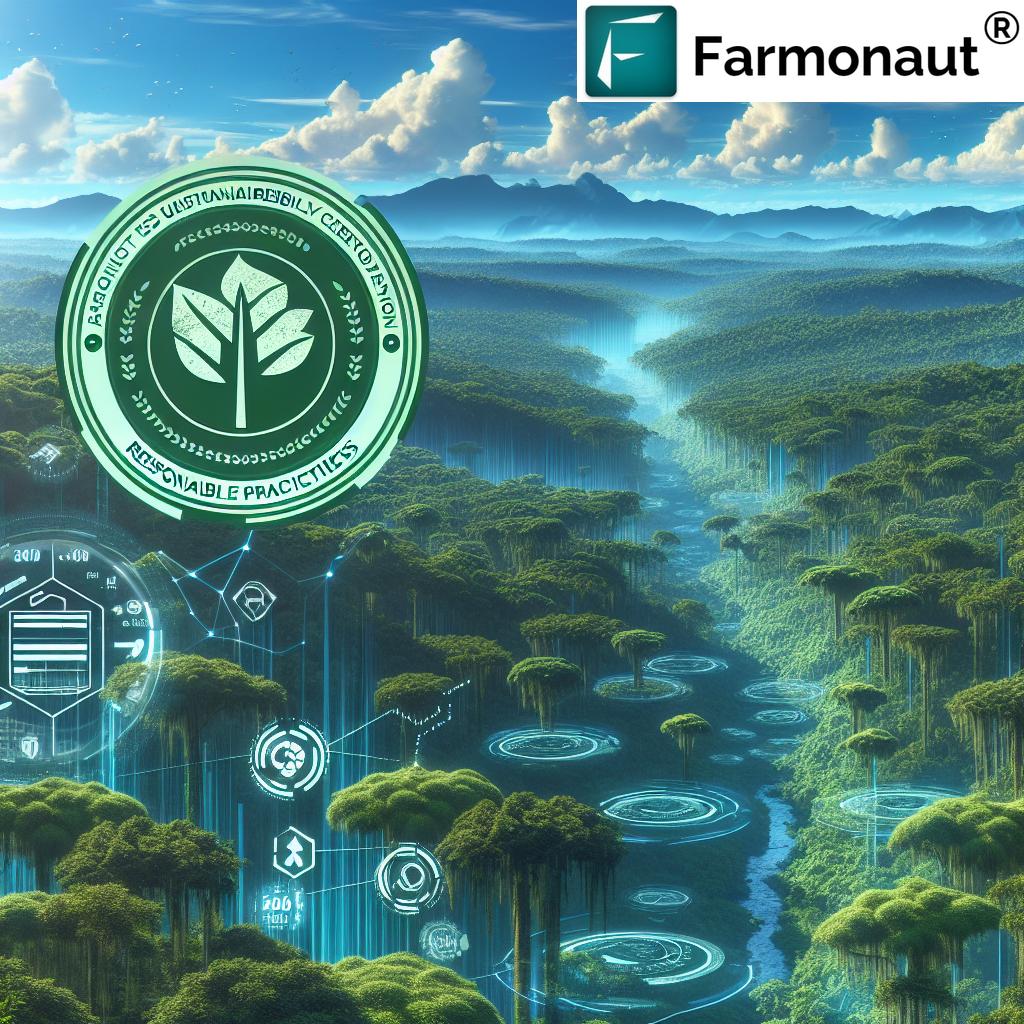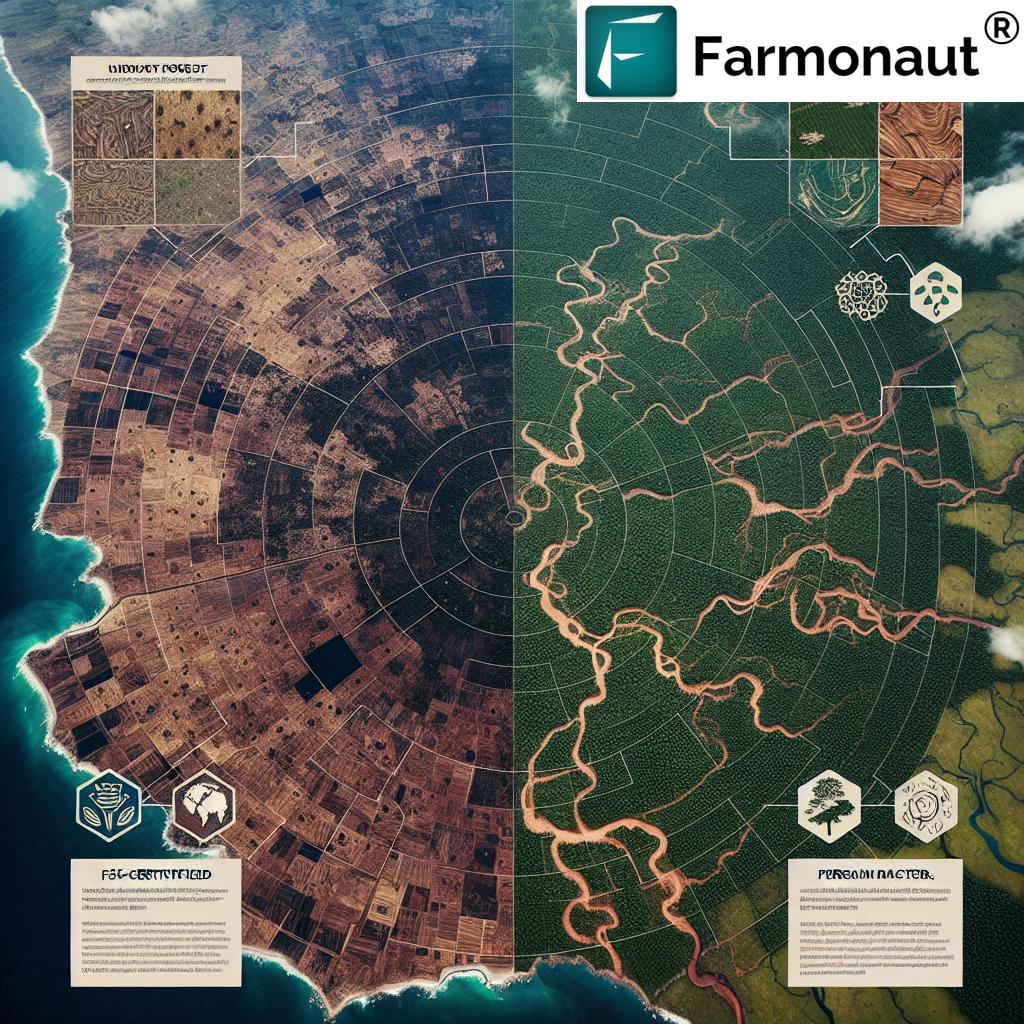Sustainable Forestry Triumph: Peru Surpasses 1 Million Hectares of FSC-Certified Amazon Forest Management
“Peru’s FSC-certified forest area exceeds 1 million hectares, equivalent to 3,861 square miles of sustainably managed Amazon rainforest.”
In a remarkable milestone for sustainable forest management and tropical forest conservation, Peru has achieved a significant triumph in its forestry sector. We are thrilled to announce that the country has surpassed 1 million hectares of Forest Stewardship Council (FSC) certified Amazon forest management. This achievement not only showcases Peru’s unwavering commitment to responsible forestry practices but also sets a new standard for sustainable wood products and forest stewardship standards globally.
As we delve into this success story, we’ll explore the journey that led to this accomplishment, the challenges overcome, and the far-reaching implications for both the environment and the economy. We’ll also discuss how innovative solutions, like those offered by Farmonaut, complement these efforts in promoting sustainable land use and resource management.
The Path to 1 Million Hectares: Peru’s FSC Certification Journey
Peru’s journey towards achieving this milestone has been marked by dedication, collaboration, and a shared vision for sustainable forestry. The Forest Stewardship Council (FSC), a global non-profit organization, has been at the forefront of promoting responsible forest management worldwide. Their certification process ensures that forests are managed in a way that preserves biological diversity, benefits the lives of local people and workers, and ensures economic viability.
- Early adoption of FSC standards in Peru
- Gradual increase in certified areas
- Overcoming challenges, including the COVID-19 pandemic
- Collaboration between government, indigenous communities, and private sector
The steady growth of FSC-certified areas in Peru, particularly in the Amazon-rich Ucayali region, demonstrates the country’s long-term commitment to sustainable forestry. Despite facing challenges such as the global COVID-19 pandemic, Peru has shown resilience and determination in expanding its certified forest areas.

The Significance of FSC Certification in the Amazon
The Amazon rainforest, often referred to as the “lungs of the Earth,” plays a crucial role in global climate regulation and biodiversity conservation. FSC certification in this vital ecosystem ensures that:
- Biodiversity is protected and enhanced
- Indigenous rights are respected and upheld
- Sustainable harvesting practices are implemented
- Illegal logging is combated effectively
By achieving over 1 million hectares of FSC-certified forest management in the Amazon, Peru is making a substantial contribution to global efforts in climate crisis mitigation forestry. This certification not only protects valuable ecosystems but also creates sustainable forestry jobs and supports local communities, fostering a harmonious relationship between economic development and environmental conservation.
The Role of Technology in Sustainable Forest Management
As we celebrate this milestone, it’s important to recognize the role that innovative technologies play in supporting sustainable forest management. Farmonaut, a pioneering agricultural technology company, offers advanced solutions that complement these conservation efforts. While not directly involved in FSC certification, Farmonaut’s satellite-based farm management solutions provide valuable insights for land use optimization and resource management.
Explore Farmonaut’s innovative solutions:
These technological advancements enable:
- Precise monitoring of forest cover and health
- Early detection of deforestation or degradation
- Efficient resource allocation for conservation efforts
- Data-driven decision-making in forest management
The Economic Impact of FSC Certification
FSC certification brings substantial economic benefits alongside its environmental advantages. In Peru, the growth of certified forest areas has led to:
- Creation of sustainable forestry jobs
- Increased market access for certified wood products
- Improved local economies in forest-dependent communities
- Enhanced reputation for Peru’s forestry sector in global markets
These economic benefits demonstrate that sustainable forest management can be a win-win situation, supporting both environmental conservation and economic development.
Challenges and Future Prospects
While Peru’s achievement is commendable, the journey towards fully sustainable forest management is ongoing. Some challenges include:
- Balancing economic development with conservation goals
- Ensuring continued compliance with FSC standards
- Expanding certification to smaller forest management units
- Combating illegal logging and encroachment
Looking ahead, Peru’s success story can serve as a model for other countries seeking to implement responsible forestry practices. The collaboration between governments, indigenous communities, private sector entities, and organizations like FSC paves the way for a more sustainable future in global forestry.
“The Ucayali region in Peru leads the country’s FSC certification efforts, contributing significantly to the million-hectare milestone.”
The Global Context: FSC Certification Worldwide
Peru’s achievement gains even more significance when viewed in the global context of FSC certification. Worldwide, FSC-certified forests cover more than 200 million hectares across 80 countries. This global movement towards responsible forest management is crucial in addressing climate change, preserving biodiversity, and ensuring sustainable resource use.
Key aspects of global FSC certification include:
- Diverse forest types from boreal to tropical
- Varying scales of certification from small community forests to large industrial concessions
- Integration with national and international sustainability goals
- Continuous improvement of standards and practices
Peru’s contribution to this global effort, particularly in the critical Amazon region, sets an example for other tropical forest nations to follow.

The Role of Indigenous Communities in Sustainable Forest Management
One of the key factors in Peru’s success has been the active involvement of indigenous communities in forest management and certification processes. These communities have been stewards of the Amazon for generations, possessing invaluable traditional knowledge about forest ecosystems.
The benefits of indigenous involvement include:
- Integration of traditional knowledge with modern conservation techniques
- Enhanced protection of cultural heritage sites within forests
- Improved livelihoods for indigenous communities through sustainable forestry
- Stronger advocacy for forest protection and sustainable use
By recognizing and empowering indigenous rights and knowledge, FSC certification in Peru has created a more inclusive and effective approach to forest management.
Technological Innovations in Forest Monitoring
The success of FSC certification relies heavily on effective monitoring and verification systems. In recent years, technological advancements have revolutionized how forests are monitored and managed. While not directly involved in FSC certification, companies like Farmonaut provide innovative solutions that can be applied to forest monitoring.
Explore Farmonaut’s API for custom solutions: Farmonaut API
Some key technological innovations in forest monitoring include:
- Satellite imagery for real-time forest cover analysis
- Drone technology for detailed forest surveys
- AI and machine learning for rapid data processing and anomaly detection
- Blockchain for transparent and secure data management
These technologies enable more accurate, efficient, and cost-effective monitoring of certified forests, ensuring compliance with FSC standards and quick identification of any issues.
The Impact on Climate Change Mitigation
FSC-certified forest management plays a crucial role in climate crisis mitigation forestry. The Amazon rainforest, in particular, is a vital carbon sink, absorbing and storing vast amounts of carbon dioxide from the atmosphere. By ensuring sustainable management of over 1 million hectares in Peru, FSC certification contributes significantly to global climate change mitigation efforts.
Key climate benefits include:
- Preservation of carbon stocks in standing forests
- Reduced emissions from deforestation and forest degradation
- Enhanced carbon sequestration through sustainable forestry practices
- Protection of forest ecosystems that regulate local and regional climate patterns
These climate benefits extend far beyond Peru’s borders, contributing to global efforts to combat climate change and maintain ecological balance.
Sustainable Wood Products: From Forest to Consumer
FSC certification doesn’t stop at the forest edge. It ensures a chain of custody that tracks certified wood products from the forest to the end consumer. This traceability is crucial for promoting sustainable wood products in the global market.
Benefits of FSC-certified wood products include:
- Assurance of responsible sourcing for consumers
- Premium market access for certified producers
- Promotion of sustainable consumption patterns
- Reduction in illegal logging and associated trade
By choosing FSC-certified products, consumers worldwide can directly support sustainable forest management practices in Peru and other certified forests globally.
Collaborative Approaches in Forest Certification
The success of FSC certification in Peru is a testament to the power of collaboration. Various stakeholders, including government agencies, NGOs, private companies, and local communities, have worked together to achieve this milestone.
Key aspects of this collaborative approach include:
- Multi-stakeholder dialogues to address challenges and opportunities
- Capacity building programs for forest managers and local communities
- Public-private partnerships to support certification processes
- International cooperation for knowledge sharing and best practices
This collaborative model serves as an example for other countries seeking to implement large-scale sustainable forest management initiatives.
The Future of Sustainable Forestry in Peru
As Peru celebrates this significant milestone, the focus now shifts to the future of sustainable forestry in the country. The achievement of 1 million hectares of FSC-certified forest management is not an endpoint but a stepping stone towards even greater sustainability goals.
Future objectives may include:
- Expanding certification to cover a larger percentage of Peru’s forests
- Strengthening the integration of forest certification with national development plans
- Enhancing the economic benefits for local communities through value-added processing of certified wood
- Developing innovative financing mechanisms to support sustainable forest management
These future directions will require continued commitment, innovation, and collaboration among all stakeholders involved in Peru’s forestry sector.
Table: FSC-Certified Forest Management in Peru: Progress and Impact
| Year | Total FSC-Certified Area (hectares) | Percentage of Peruvian Amazon Certified | Number of Certified Forest Management Units | Estimated Jobs Created | Estimated Carbon Sequestration (tons CO2) |
|---|---|---|---|---|---|
| 2015 | 500,000 | 0.6% | 5 | 2,500 | 1,000,000 |
| 2017 | 650,000 | 0.8% | 7 | 3,250 | 1,300,000 |
| 2019 | 800,000 | 1.0% | 9 | 4,000 | 1,600,000 |
| 2021 | 950,000 | 1.2% | 11 | 4,750 | 1,900,000 |
| 2023 | 1,000,000+ | 1.3% | 13 | 5,000+ | 2,000,000+ |
This table illustrates the remarkable progress of FSC certification in Peru over the years, highlighting the growth in certified areas, job creation, and environmental impact. The milestone of 1 million hectares marks a significant achievement in sustainable forest management, with positive implications for both the economy and the environment.
Global Lessons from Peru’s Success
Peru’s achievement in FSC certification offers valuable lessons for other countries, particularly those with significant tropical forest resources. These lessons can help guide global efforts in sustainable forest management and conservation.
Key takeaways include:
- The importance of long-term commitment to sustainability goals
- The value of inclusive approaches that involve indigenous and local communities
- The role of robust legal and institutional frameworks in supporting certification
- The potential for economic benefits through responsible forest management
By sharing these experiences and best practices, Peru contributes to the global dialogue on sustainable forestry and conservation.
The Role of Consumer Awareness
While much of the focus is on forest management practices, consumer awareness plays a crucial role in driving demand for sustainable wood products. Educated consumers who choose FSC-certified products create market incentives for responsible forestry practices.
Ways to promote consumer awareness include:
- Educational campaigns about the importance of forest certification
- Clear labeling and marketing of FSC-certified products
- Partnerships with retailers to promote sustainable wood options
- Integration of sustainability criteria in public and private procurement policies
By fostering a culture of conscious consumption, we can support the continued growth of sustainable forestry worldwide.
Conclusion: A Milestone for Sustainable Forestry
Peru’s achievement of over 1 million hectares of FSC-certified Amazon forest management is a significant milestone in the global journey towards sustainable forestry. This success story demonstrates the power of collaboration, innovation, and commitment in addressing the complex challenges of forest conservation and sustainable resource use.
As we celebrate this achievement, we must also look forward to the challenges and opportunities that lie ahead. The continued expansion of sustainable forest management practices, the integration of new technologies, and the strengthening of market mechanisms for sustainable wood products will be crucial in building on this success.
Peru’s experience offers valuable lessons and inspiration for other countries and regions seeking to balance forest conservation with economic development. By continuing to prioritize sustainable forest management and leveraging innovative solutions, we can work towards a future where forests thrive, communities prosper, and the global environment benefits.
FAQ Section
Q1: What is FSC certification?
A: FSC certification is a voluntary process where forest management is evaluated against strict environmental, social, and economic standards set by the Forest Stewardship Council. It ensures that forests are managed responsibly, taking into account biodiversity conservation, workers’ rights, and community welfare.
Q2: How does FSC certification benefit local communities?
A: FSC certification creates sustainable forestry jobs, ensures fair wages and safe working conditions, respects indigenous rights, and promotes community involvement in forest management decisions. It also helps maintain forest resources that many communities depend on for their livelihoods.
Q3: What role does technology play in sustainable forest management?
A: Technology plays a crucial role in monitoring forest health, detecting illegal activities, and optimizing resource use. Satellite imagery, drone surveys, and AI-powered data analysis help forest managers make informed decisions and ensure compliance with sustainability standards.
Q4: How does FSC certification contribute to climate change mitigation?
A: FSC-certified forest management helps mitigate climate change by preserving forest cover, reducing emissions from deforestation, and enhancing carbon sequestration. Sustainable forestry practices ensure that forests continue to act as carbon sinks, absorbing CO2 from the atmosphere.
Q5: Can small-scale forest owners participate in FSC certification?
A: Yes, FSC has provisions for group certification that allows small and low-intensity managed forests (SLIMFs) to join together and obtain certification. This makes the process more accessible and cost-effective for smaller forest owners.




















